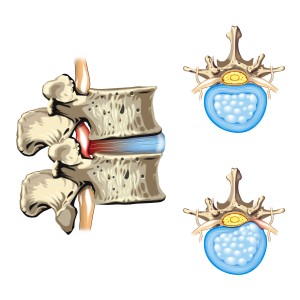Lumbar disc problems can be very painful and worrying but are quite common
and usually respond well to conservative care.
Terms such as prolapsed disc, herniated disc, protruded disc, disc bulge or
slipped disc are often used to describe disc problems.
Symptoms in the leg are sometimes called sciatica or a trapped nerve.
Disc problems occur for many reasons. They may be due to stress and strain
on the back causing wear and there may be a genetic component. A worn disc
is sometimes described as a dehydrated, dry or black disc because of the way
it looks on scans. Disc problems often occur in people who have a history of
recurrent low back pain.
Symptoms
As a disc wears, the inner core can bulge or herniate into the spinal canal.
This can press on the nerves that go down your leg causing combinations of
back, buttock and leg pain. Sometimes weakness, numbness or pins and
needles occur in the leg or foot. You do not need to have all of the symptoms
to be diagnosed with a disc problem.
Treatment
Chiropractic treatment can often help but it can take some weeks to improve the
symptoms. It may take several months to fully recover. Prognosis and recovery is
usually good as long as you are sensible and follow advice. Pain relief medication
may help recovery but this should only be taken if it is appropriate for you. Your
chiropractor may recommend that you discuss this with your General Practitioner.
In some cases, where disc problems are not settling, your chiropractor may
suggest an MRI scan to confirm the nature of the injury. Some persistent or severe
cases of disc herniation may require surgery.
Helping yourself
In general, you should avoid lifting and bending and prolonged periods of sitting.
Keep gently mobile. Walking usually helps recovery too. Once recovery is
underway, you may be given exercises to help stabilise the disc problem.
Be aware
In rare cases disc material can prolapse and compress nerves that supply
the pelvic organs and legs. This is known as Cauda Equina Syndrome and is
regarded as a medical emergency. Immediate advice should be sought from your
chiropractor or if unavailable the A & E department of your local hospital.
Symptoms of Cauda Equina Syndrome include:
~ Severe low back pain with sciatica down one or both legs
~ Bladder dysfunction (a feeling of not fully emptying your bladder or becoming
incontinent of urine)
~ Bowel dysfunction (not being able to retain faeces or a change in bowel
function)
~ Numbness or altered sensation in the buttocks or between the legs
~ Progressive weakness in the legs and/or feet
~ Changes in sexual function
Rapid assessment is vital to optimise recovery. If you have any questions,
please speak to your chiropractor.
Take your first step towards enjoying your life more
From the team at Well Adjusted Health
 Providing gentle chiropractic in West Sussex
Providing gentle chiropractic in West Sussex
including Ashington, Storrington, Steyning, Southwater, Horsham, Shoreham, Worthing and Billingshurst

